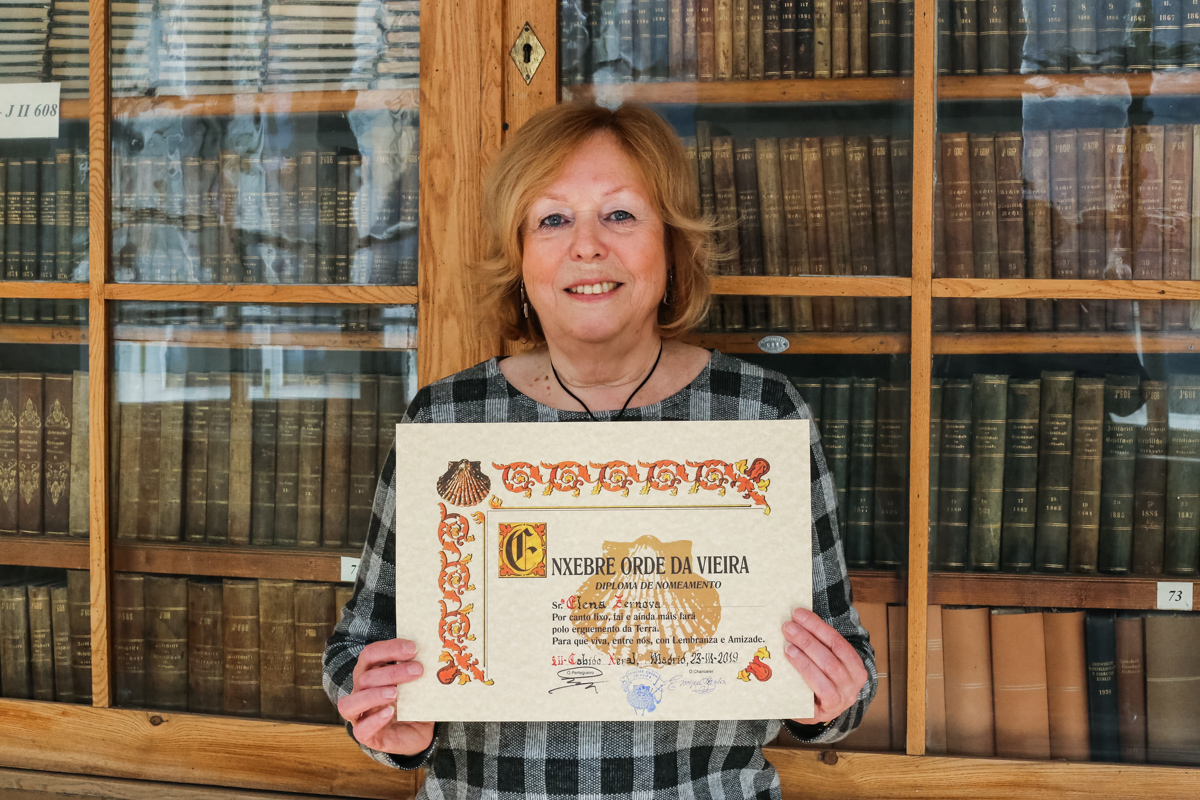Associate Professor Elena Zernova has become a member of the ‘Orde da Vieira’

Associate Professor of St Petersburg University Elena Zernova is a corresponding member of the Royal Galician Academy and the Head of the Centre for Galician Studies at the University. She has been singled out for her contribution to the promotion of culture and popularisation of the minority languages in Spain. Elena Zernova has become a member of the ‘Enxebre Orde da Vieira’, a confraternity of Galicians – the successor to a medieval monastic order.
Not only is this event unique for Russia, it is also special for the Order itself. To begin with, Elena Zernova is the first representative of Russia in this association. Secondly, only individuals of Galician descent could become members of the Order. For the first time in its history, the Chapter (the governing body of the Order) decided to make an exception deviating from the ‘kinship-based rule’ as several institutions had been soliciting Zernova’s nomination for three years.
The ‘Orde da Vieira’ carries on the traditions of a medieval religious order, founded in Spain in the 9th century. Members of the order at that time were pilgrims to Santiago de Compostela (the capital of the modern-day Galicia) who embarked on a pilgrimage trail to visit the relics of Apostle James, the Patron Saint of Spain. The Order was restored in Madrid in 1967 with exclusively cultural objectives – to unite Galicians throughout the world and promote the culture of the region.
Membership of the Order includes many well-known writers (notably, the Nobel Prize winner in Literature in 1989 Camilo José Cela), scholars (representatives of the Spanish Royal Academy and NASA), several former Latin American leaders (of Argentina, Uruguay and other countries), and businessmen. Among the members of the order are citizens of several dozen countries across four continents.
For many years, the University’s Department of Romance Philology has been developing a large-scale project to produce anthologies representing the minority cultures of Spain (compiled and edited by Elena Zernova). More than 30 volumes have been already published, the most recent being the anthology of the Catalan poetry. In this book, for the first time in Russia, every stage in the history of Catalan poetry – from the 12th century to the present day – has been fully represented, featuring works by most prominent Catalan poets.
Membership in the ‘Orde da Vieira’ is recognition for services to Galicia. The official letter of introduction reads: ‘For all s/he has done, for all s/he is doing and for all s/he is to do in the future for the good of our land, so that s/he will always live in our hearts, as a token of regard and friendly feelings.’ The Order does not collect membership dues, nor does it administer funds – it is a free association of like-minded people united by their love for Galicia.
Elena Zernova revealed that the Order emphasises the importance of preserving time-honoured customs and sacred rituals. The solemn ceremony of dedication is held annually in Madrid at the end of March. The ‘novices’ are clothed in pilgrims’ cloaks, a scallop shell on a red cord, a symbol of pilgrimage, is put on around their necks, and a golden badge is pinned to the lapels of their jackets.
The scallop shell (or ‘vieira’ in Galician and Spanish) is a symbol of Camino de Santiago that unites dozens of pilgrimage routes leading to the supposed sepulchre of Apostle James in Santiago de Compostela, nicknamed the "Christian Mecca". Scallop images decorate buildings and the road along the entire route: in the Middle Ages, pilgrims wore scallops on their clothes and used them for scooping water.

